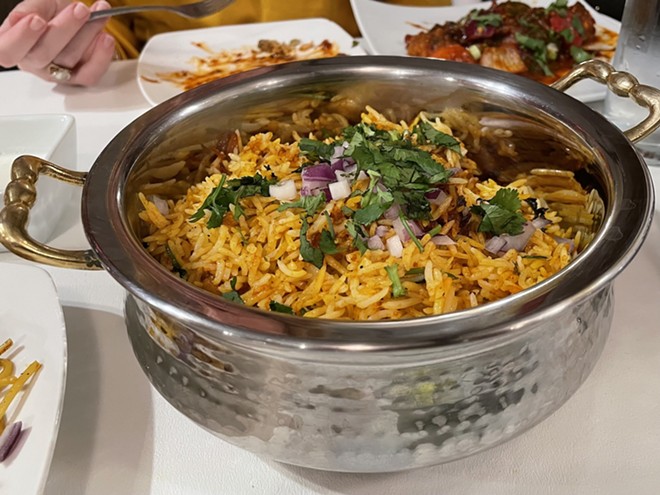After making a quick detour on our way to Columbus a few years back, my wife and I landed at Saraga Grocery, a sprawling international foods market just north of town. It was there, at a cramped food stall pushed to the perimeter of the building, that I tasted my first momo. Ever since, I have made a point of tracking down these delightful Nepalese dumplings wherever they appear.
In Northeast Ohio, that includes Himalayan Restaurant near West Park, a few spots in Akron and now Café Everest, which arrived this past summer. The restaurant was opened by Tarah Baraily, a refugee from Nepal who landed in San Antonio in 2011. A few years later he made his way to Cleveland, where he continued to pursue his passion for home cooking. It was a lifelong dream of his, he says, to one day be able to share his food with a larger audience.
“I like cooking,” Baraily shares. “I always wanted to have a restaurant where I could give people authentic Nepalese food because we don’t really have many Nepalese restaurants here. I’m not a pro cook or anything; it’s what I cook and eat at home.”
That homestyle approach to cooking is making an impression on Northeast Ohio’s large, but dispersed, Nepalese community. The restaurant’s takes on dishes like jhol momos, chicken chow mein and goat sekuwa offer wistful emigrants a comforting taste of home.
“Nepalese people love jhol momos and chow mein,” Baraily reports. “When they come, they don’t even look at the menu.”
Guests who elect to dine in the attractive little dining room are treated to a wide bowl of steaming-hot lentil soup. The complimentary brew, made with red, yellow and green lentils, is pureed until smooth and packed with hints of cumin, curry and coconut milk.
“I was thinking what to give people when they wait for their food,” says Baraily, adding that the conventional free starter is papadum. “It’s usually cold here so why not.”
For the popular jhol momo ($9.99), the traditional stuffed dumplings served in spicy soup, the kitchen swaps the usual chicken broth base for a vegetable-based one, thus opening the dish up to vegans and vegetarians. But diners can order chicken filled jhol momo as well. In the chili momo ($9.99), also stuffed either with ground chicken or vegetables, the dumplings are stir-fried with vegetables in a spicy tomato-based sauce.
Goat sekuwa ($12.99) is a street food-style dish consisting of marinated and grilled meat that is smoky, charred and flavorful, albeit chewy. Baraily says that back home, the cubed meat would be skewered and grilled over a wood fire. It is paired with vivid red and blazing hot chutney for dipping, crunchy roasted soy beans and “beaten rice,” which is toasted, flattened rice flakes. The kitchen also prepares versions made with chicken or lamb.
Like many Nepalese and Tibetan restaurants, Café Everest features familiar-sounding Indian and Chinese items like shrimp fried rice, chicken curry and aloo gobi. But even if the names of the dishes sound familiar, says the owner, they will taste completely different.
“We use many of the same ingredients and spices, but the way we prepare it is quite different,” he explains.
Café Everest’s chicken chow mein ($9.99) is a perfect example. The version prepared here stars firm, not soft or flabby, noodles that are just barely coated in sauce. The predominant flavors are garlic, ginger, cumin and chile, with only a few dashes of soy sauce. On top is a garnish of diced red onions and fresh herbs.
To make the chicken biryani ($13.99), the kitchen marinates Halal chicken thighs in a mixture of garlic paste, ginger paste, lemon and yogurt for two days before cooking it, tossing it with long-grain rice and serving it in a hammered-brass serving vessel. The meat is juicy and flavorful, and the rice pops with hits of cardamom and mint.
For dessert, Baraily whips up three classic sweets. The ras malai ($2.99) is almost indescribably tantalizing. Airy cheese dumplings are served in a thin sauce of sweetened condensed milk perfumed with cardamon and saffron. The dish is often described as “crustless cheesecake” but that portrayal falls well short of the mark. Café Everest also offers gulab jamun, fried dough balls tossed in rose-scented syrup, and kheer, a rich and creamy rice pudding.
“It’s too much work,” Baraily jokes of the labor-intensive desserts.
Café Everest
14304 Puritas Ave., Cleveland
216-476-2990
cafeeverest.com


